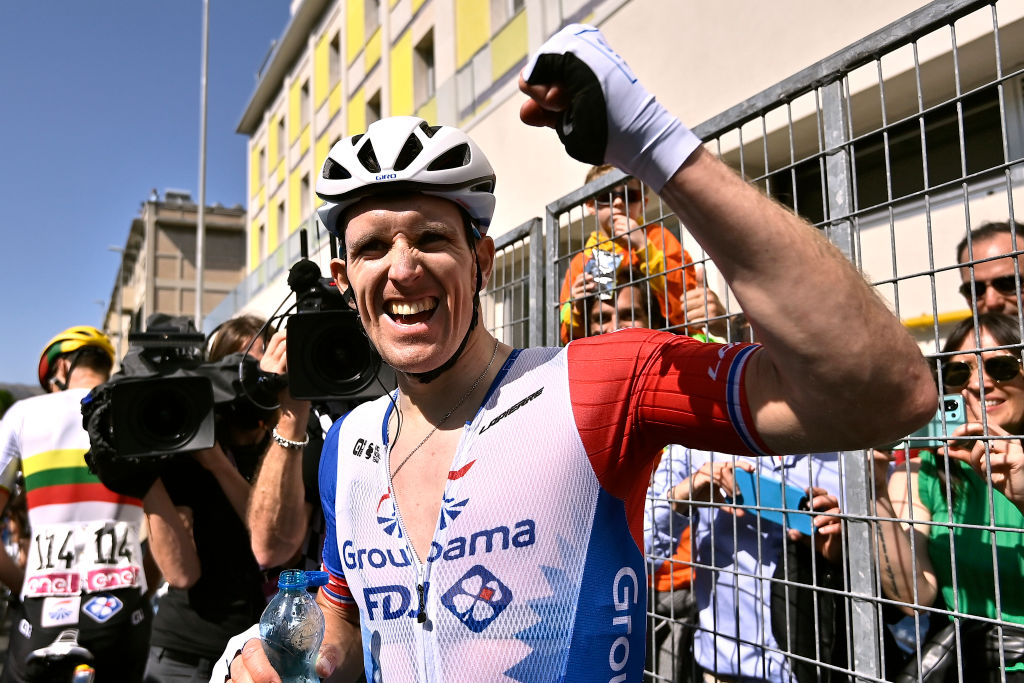Démare delighted to get winning mojo back at Giro d'Italia
Frenchman claims first victory since 2021 Paris-Tours

“When I raised my arms, my feeling was one of real relief,” was how Arnaud Démare (Groupama-FDJ) described his sensations as he powered across the finish line on Wednesday in Messina ahead of the rest of the Giro d'Italia peloton.
“This one had been a long time coming.”
Démare has captured at least one stage victory in each of his three most recent participations in the Giro d’Italia, but Wednesday’s hard-fought stage 5 triumph was his first since Paris-Tours last autumn. For a rider who has now claimed 85 wins since turning pro in 2012, Démare’s sense of an overly long wait between victories, then, made perfect sense.
"I have been up there in quite a few races between now and last year in Paris-Tours," he said after securing his first win of 2022, "but for whatever reason, until today an actual win didn't happen."
However, Démare recognised that he and his team had spent a lot of time preparing their strategy for the stage 5 bunch sprint, with the first pieces in the jigsaw puzzle that made up their victory falling into place considerably earlier, on the mid-race Portella Mandrazzi climb.
A climb he already knew from the 2020 Giro, challengers as dangerous as Mark Cavendish (QuickStep-AlphaVinyl) and Caleb Ewan (Lotto Soudal) were both ridden out of contention on the slopes of the long second category ascent.
Démare was himself dropped on the climb, but, crucially, by far less a gap than the Briton and Australian, and he could regain contact with the main bunch. Although as he recounted afterwards, getting back on was only one segment of his road map to victory ahead of Fernando Gaviria (UAE Team Emirates) and Giacomo Nizzolo (Israel-Premier Tech).
Get The Leadout Newsletter
The latest race content, interviews, features, reviews and expert buying guides, direct to your inbox!
“When we heard Ewan and Cavendish had been dropped over the climb, we had to keep going flat out on the run-in to keep them at a distance,” the 30-year-old Frenchman recounted. “We’d already done a great descent, going full gas there so I could get back with the main group.”
As for how he got through his own moments of difficulty on the ascent, Démare said his team had studied the stage beforehand in some detail, which helped him prepare mentally. But also when he suffered on the climb, he had succeeded in managing the worst moments of crisis very well.
As Démare observed. “We knew it would be difficult and that other teams would try and push me over the edge. But I didn’t fall apart completely, I made sure I cracked little by little instead and that meant I could recover much more quickly over the top and on the first part of the descent.”
Having jettisoned Cavendish and Ewan from the equation and got back on terms with the rest of the remaining sprinters the next question for Groupama-FDJ was the sprint itself to be resolved. And here Démare faced another challenge, after Jacopo Guarnieri, his usual lead-out man, struggled on the mid-race climb and finished, like Cavendish and Ewan, more than 12 minutes down.
However, Démare and Groupama-FDJ had a Plan B in place, courtesy of Dutch teammate Ramon Sinkeldam, who substituted Guarnieri and provided Démare with a faultless lead out.
“We had to adapt for sure, but we really worked on the finish. I knew all about the corners and so on, too, in the closing kilometres,” Démare recounted.
“Ramon is in really great condition, it was a very clean sprint and Ramon gave me a long lead out, and then I could go for it. And that was how I did it."
Guarnieri will likely be able to help Démare – now leading the Giro’s points competition which he already won in 2020 – on Thursday’s much flatter leg up the western side of Calabria to the coastal resort of Scalea.
But then the opposition for a probable bunch sprint will also likely be stiffened by the presence of those fast men like Cavendish and Ewan who were dropped in Sicily, and who will be keen to impact before three far less flat stages from Friday onwards.
On top of that Gaviria, who had a mechanical incident just as he was opening up his own sprint in Messina, will also be up for sporting revenge as well. Sicily was a major battle won by Démare, then, but certainly not the Giro's sprint war.
Alasdair Fotheringham has been reporting on cycling since 1991. He has covered every Tour de France since 1992 bar one, as well as numerous other bike races of all shapes and sizes, ranging from the Olympic Games in 2008 to the now sadly defunct Subida a Urkiola hill climb in Spain. As well as working for Cyclingnews, he has also written for The Independent, The Guardian, ProCycling, The Express and Reuters.
